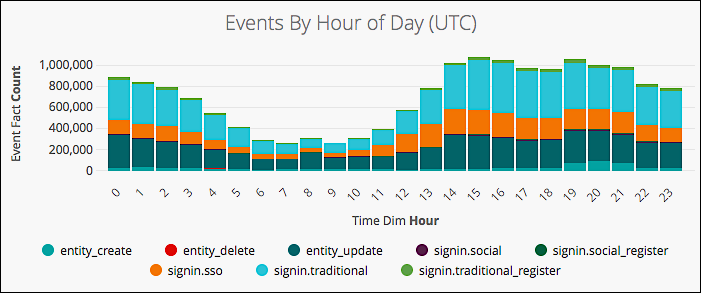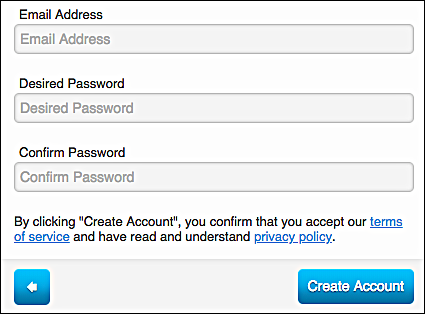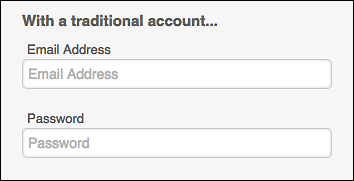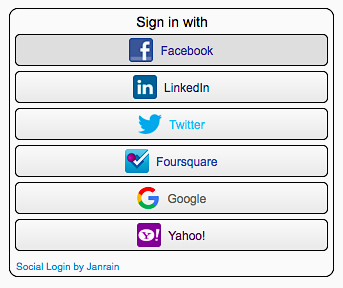Customer Insights events
This article applies to the following Customer Insights roles: Viewer; Developer
Many Customer Insights visualizations center around events and event types. For example, the following chart shows the total number of events - broken down by event type - that have occurred during each hour of the day:

Is that useful information? You bet it is … provided that you know what an event like “entity_create” actually is, and when an event like that might be triggered. You’ll find a brief overview of the Customer Insights event types in the sections below:
signin.traditional_register

A new registration, one where the user created an Identity Cloud account by using a username and password. The signin.traditional_register event is triggered when registration occurs using the Registration UI (Widget), the Registration JavaScript API, a Mobile SDK, or the OAuth API.
signin.traditional

A user authenticated (logged in) by using an Akamai username and password. The signin.traditional event is triggered when using the Registration UI (Widget), the Registration JavaScript API, a Mobile SDK, or the OAuth API.
Note that this event is fired only during a login, and not during a registration.
signin.social_register

A new registration in which the user authenticated by using a third-party identity provider such as Facebook, Twitter, or Google (i.e., a login that did not employ an Akamai username and password). The signin.social_register event is triggered when registration occurs using the Registration UI (Widget), the Registration JavaScript API, a Mobile SDK, or the OAuth API.
signin.social
User authentication (login) that employed a third-party identity provider such as Facebook, Twitter, or Google (i.e., a login that did not use an Akamai username and password). The signin.social event is triggered when login occurs using the Registration UI (Widget), the Registration JavaScript API, a Mobile SDK, or the OAuth API.
Note that this event is fired only during a social login, and not during a social registration.
signin.sso
A single-sign on (SSO) federation event. The signin.sso event is triggered any time a user is automatically authenticated (logged on) to another site within an SSO federation of sites; this is true regardless of whether the user initially logged on by using traditional sign-in or social sign-in.
For example, suppose a user employs traditional sign-in to log on to Site A; at that point, the sign-in.traditional event is fired. The user then clicks a link and is taken to Site B, a site within the same federation of sites as Site A. When the user arrives at Site B, the user is automatically logged on, and the signin.sso event occurs.
entity_create
An entity (user profile) has been created. The entity_create event is triggered during both social and traditional registrations, as well as during bulk entity imports and API-only implementations that directly call the Entity API operation (bypassing the OAuth and Registration JavaScript APIs). However, bulk imports and API-only implementations do not trigger the signin.social_register or the signin.traditional_register events. Bulk imports and API-only implementations are represented only by entity_create events.
That, by the way, is why Akamai collects entity_create events in addition to signin.social_register and signin.traditional_register events. For example, suppose 25 users register for a site using traditional registration; you then add 20 more users by using bulk import. In Customer Insights, you will see 25 signin.traditional_register events, one for each user who signed up by using traditional registration. What you will not see are signin.traditional_register events for the users added by using bulk import: bulk import does not trigger registration events. However, there will be 45 event_create events: 25 for the traditional registrations plus 20 for the bulk import.
entity_update
An entity (user profile) has been updated or changed. The entity_update event is triggered any time a profile is edited , either by the user, an administrator, or any other person or process. This event is also fired each time a user authenticates; that’s because, with every logon, the last login date attribute is updated. In turn, that means the user profile is updated.
Note that the entity_update event is not triggered when an entity.replace API call is made. During an entity replace, the user profile is not really updated; instead, it is effectively replaced by a new user profile.
entity_delete
An entity (user profile) has been deleted. This event is triggered only when a user profile is deleted from the system; deactivating an account does not fire the entity_delete event. That’s because deactivation simply changes the deactivation date attribute, an action that fires an entity_update event instead. The account itself is not deleted (and can be restored, in full, simply by clearing the deactivation date attribute).
Note: Customer Insights and Hosted Login Single Sign-On events
Although Customer Insights collects information about a wide variety of Identity Cloud events, there’s at least one major event type that isn’t available to Customer Insights users: Hosted Login single sign-on (SSO) events.
Admittedly, this might come as a surprise to you: after all, single sign-on events using the JavaScript SDK are available in Customer Insights. (That’s what the signin.sso event is for.) However, Hosted Login and the JavaScript SDK use different approaches to single sign-on; because of that, Hosted Login generates a different event type than the one generated by the JavaScript SDK (signin.sso). And, for better or worse, the SSO event generated by Hosted Login is not yet available in Customer Insights.
So what does that mean to you? It means this:
-
If you’re using SSO and the JavaScript SDK then, any time a user logs in by using single sign-on, a signin.sso event is generated and made available to Customer Insights.
-
If you’re using SSO and Hosted Login then, any time a user logs in by using single sign-on, a signin.sso event is not generated. Instead, a different event type is generated, but that event type isn’t currently available in Hosted Login.
Note that, with Hosted Login, you’ll still get traditional and social sign-in events; for example, if a user logs on to Website A then a signin.traditional or a signin.social event will show up in Customer Insights. However, if that user then employs SSO to sign in to Website B, that single sign-on occurrence will not show up in Customer Insights.
-
If you’re not using SSO then none of this matters to you. (Why not? Because, without single sign-on, no signin.sso events are ever generated anyway.)
This might change in the future: somewhere down the road Hosted Login single sign-on events could become available in Customer Insights. For now, however, Hosted Login SSO events don't show up in Customer Insights.
Updated about 3 years ago
